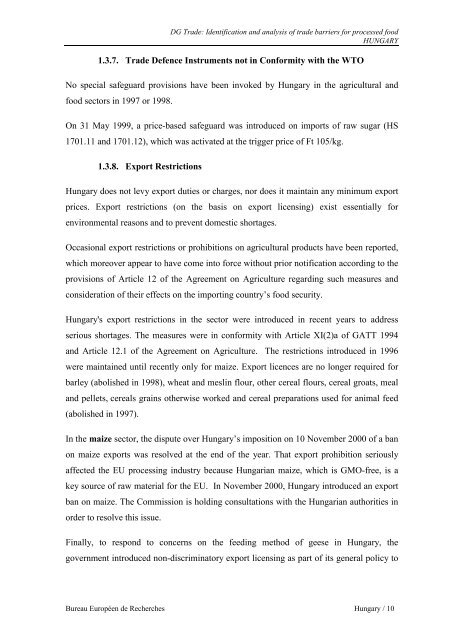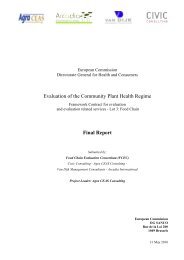HUNGARY Report.pdf - Agra CEAS Consulting
HUNGARY Report.pdf - Agra CEAS Consulting
HUNGARY Report.pdf - Agra CEAS Consulting
- No tags were found...
Create successful ePaper yourself
Turn your PDF publications into a flip-book with our unique Google optimized e-Paper software.
DG Trade: Identification and analysis of trade barriers for processed food<strong>HUNGARY</strong>1.3.7. Trade Defence Instruments not in Conformity with the WTONo special safeguard provisions have been invoked by Hungary in the agricultural andfood sectors in 1997 or 1998.On 31 May 1999, a price-based safeguard was introduced on imports of raw sugar (HS1701.11 and 1701.12), which was activated at the trigger price of Ft 105/kg.1.3.8. Export RestrictionsHungary does not levy export duties or charges, nor does it maintain any minimum exportprices. Export restrictions (on the basis on export licensing) exist essentially forenvironmental reasons and to prevent domestic shortages.Occasional export restrictions or prohibitions on agricultural products have been reported,which moreover appear to have come into force without prior notification according to theprovisions of Article 12 of the Agreement on Agriculture regarding such measures andconsideration of their effects on the importing country’s food security.Hungary's export restrictions in the sector were introduced in recent years to addressserious shortages. The measures were in conformity with Article XI(2)a of GATT 1994and Article 12.1 of the Agreement on Agriculture. The restrictions introduced in 1996were maintained until recently only for maize. Export licences are no longer required forbarley (abolished in 1998), wheat and meslin flour, other cereal flours, cereal groats, mealand pellets, cereals grains otherwise worked and cereal preparations used for animal feed(abolished in 1997).In the maize sector, the dispute over Hungary’s imposition on 10 November 2000 of a banon maize exports was resolved at the end of the year. That export prohibition seriouslyaffected the EU processing industry because Hungarian maize, which is GMO-free, is akey source of raw material for the EU. In November 2000, Hungary introduced an exportban on maize. The Commission is holding consultations with the Hungarian authorities inorder to resolve this issue.Finally, to respond to concerns on the feeding method of geese in Hungary, thegovernment introduced non-discriminatory export licensing as part of its general policy toBureau Européen de Recherches Hungary / 10













